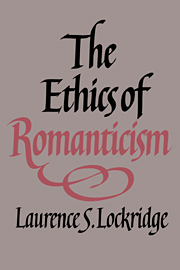Book contents
- Frontmatter
- Contents
- Acknowledgments
- Editions and abbreviations
- Introduction
- PART ONE THE WILL TO VALUE
- PART TWO AGENT, POWER, SCENE
- PART THREE THE PRESSURE OF REALITY
- 6 Shelley and the poetry of life
- 7 Hazlitt: common sense of a dissenter
- 8 Keats and the ethics of immanence
- 9 Byron: the world as glorious blunder
- 10 The ethical bearing of literature
- Select bibliography
- Index
10 - The ethical bearing of literature
Published online by Cambridge University Press: 16 September 2009
- Frontmatter
- Contents
- Acknowledgments
- Editions and abbreviations
- Introduction
- PART ONE THE WILL TO VALUE
- PART TWO AGENT, POWER, SCENE
- PART THREE THE PRESSURE OF REALITY
- 6 Shelley and the poetry of life
- 7 Hazlitt: common sense of a dissenter
- 8 Keats and the ethics of immanence
- 9 Byron: the world as glorious blunder
- 10 The ethical bearing of literature
- Select bibliography
- Index
Summary
In this strenuous excursion through the moral landscapes of Romantic authors from Blake to Byron, we have seen shifting patterns more complex than can be gauged by the single variable of relative brightness or darkness. Famous for his “pessimism,” Byron is linked to Blake through his reanimation in Don Juan of the instinctive passion for sensate life that may even have begun to dim in the later Blake. And we have noted that Byron, like the others, affirms a plurality of values, if in patterns of mutual exclusion. Byron's non-dialectical ethics does not remove him from this larger effort to re-value a moral landscape that has come to seem ruined and bereft of value.
Like Blake before him, Byron has found it difficult to coordinate the imperatives of action with this reanimation of values. Blake urges acts of “intellectual fight,” often imagistically brutal, in pursuit of values themselves both spirited and pacific. For Byron, the antipodal ordering of values that defines the human predicament forces the agent to acts of exclusion, demonstrated in the extreme by Manfred, who affirms himself as agent in the act of permanently excluding all values down to his very life. In Don Juan Byron implies that a comically contingent world has a way of giving the agent sufficient opportunities to balance for a time this pattern of loss and self-ruin. Much comes along answering to our energies and appetites.
- Type
- Chapter
- Information
- The Ethics of Romanticism , pp. 450 - 463Publisher: Cambridge University PressPrint publication year: 1989

